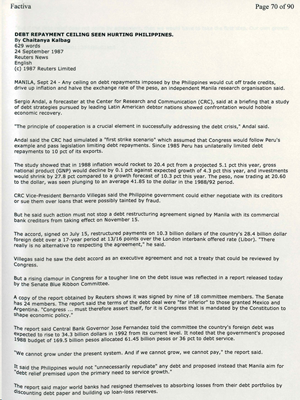DEBT REPAYMENT CEILING SEEN HURTING PHILIPPINES
[Reuters]
Published date: 24th Sep 1987
24 September 1987
Reuters News
English
(c) 1987 Reuters Limited
MANILA, Sept 24 – Any ceiling on debt repayments imposed by the Philippines would cut off trade credits, drive up inflation and halve the exchange rate of the peso, an independent Manila research organization said.
Sergio Andal, a forecaster at the Center for Research and Communication (CRC), said at a briefing that a study of debt strategies pursued by leading Latin American debtor nations showed confrontation would hobble economic recovery.
“The principle of cooperation is a crucial element in successfully addressing the debt crisis,” Andal said.
Andal said the CRC had simulated a “first strike scenario” which assumed that Congress would follow Peru’s example and pass legislation limiting debt repayments. Since 1985 Peru has unilaterally limited debt repayments to 10 pct of its exports.
The study showed that in 1988 inflation would rocket to 20.4 pct from a projected 5.1 pct this year, gross national product (GNP) would decline by 0.1 pct against expected growth of 4.3 pct this year, and investments would shrink by 27.8 pct compared to a growth forecast of 10.3 pct this year. The peso, now trading at 20.60 to the dollar, was seen plunging to an average 41.85 to the dollar in the 1988/92 period.
CRC Vice-President Bernardo Villegas said the Philippine government could either negotiate with its creditors or sue them over loans that were possibly tainted by fraud.
But he said such action must not stop a debt restructuring agreement signed by Manila with its commercial bank creditors from taking effect on November 15.
The accord, signed on July 15, restructured payments on 10.3 billion dollars of the country’s 28.4 billion dollar foreign debt over a 17-year period at 13/16 points over the London interbank offered rate (Libor). “There really is no alternative to respecting the agreement,” he said.
Villegas said he saw the debt accord as an executive agreement and not a treaty that could be reviewed by Congress.
But a rising clamour in Congress for a tougher line on the debt Issue was reflected in a report released today by the Senate Blue Ribbon Committee.
A copy of the report obtained by Reuters shows it was signed by nine of 18 committee members. The Senate has 24 members. The report said the terms of the debt deal were “far inferior” to those granted Mexico and Argentina. “Congress … must therefore assert itself, for it is Congress that is mandated by the Constitution to shape economic policy.”
The report said Central Bank Governor Jose Fernandez told the committee the country’s foreign debt was expected to rise to 34.3 billion dollars in 1992 from its current level. It noted that the government’s proposed 1988 budget of 169.5 billion pesos allocated 61.45 billion pesos or 36 pct to debt service.
“We cannot grow under the present system. And if we cannot grow, we cannot pay,” the report said.
It said the Philippines would not “unnecessarily repudiate” any debt and proposed instead that Manila aim for “debt relief premised upon the primary need to service growth.”
The report said major world banks had resigned themselves to absorbing losses from their debt portfolios by discounting debt paper and building up loan-loss reserves.
It proposed relief from interest and principal payments ranging up to 50 pct of the value of contracted loans.
If we get the concurrence of the IMF (International Monetary Fund), so much the better. If we can secure the conformity of the (bank) creditors, let us do so,” it said.
“But if the debt relief does not come by agreement, then we would have to take the first step. Our own growth comes first.”






